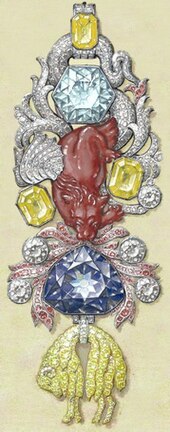The diamond is said to have been found in the mines of Kollur where it was purchased by Jean Baptiste Tavenier in 1642. Tavenier travelled to France where he sold it to Louis XIV in 1668 and it thus became a part of the French royal jewels. At the time the diamond was 115 carats before being re-cut into heart-shaped 67-carat; it was valued at 220.000 livres which is 1.421.000 pounds or 1.800.000 dollars today.
 |
| Drawings from the memoirs of Tavenier |
Louis XIV had it set in gold and wore it around his neck on a ribbon on ceremonial occasions. In the records of his time it was referred to as the Bleu de France.
However, the diamond is rumoured to be cursed and if one judges merely on the fates of those at Versailles who wore it there is something about it. When it was not around the King's neck it was in the possession of Nicholas Fouquet; Fouquet would eventually fall dramatically from grace and the jewel returned to the King.
Madame de Montespan was allowed to wear the diamond and soon after the Affair of the Poisons was revealed. Although she survived the royal favourite was removed from that title and saw her influence permanently disappear.
Louis XV wore it as a pendant and in 1749 he had it set in his personal insignia of the Royal Order of the Golden Fleece.
 |
| Order of the Golden Fleece - reconstruction drawing of the piece ordered by Louis XV |
Louis XVI inherited the stone and he also lent to a loved one: Marie Antoinette. With both of them ending their lives on the scaffold it is hardly doing a favour to the stone.'
It was stolen during the French revolution along with the majority of the French jewels. To be exact it was stolen before the executions of the monarchs since it disappeared from the inventory list of the royal family in 1792.


No comments:
Post a Comment